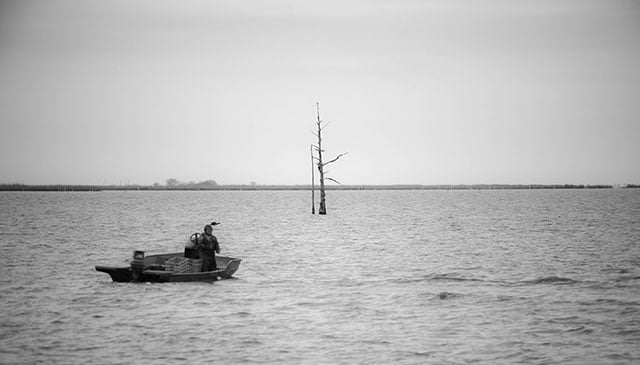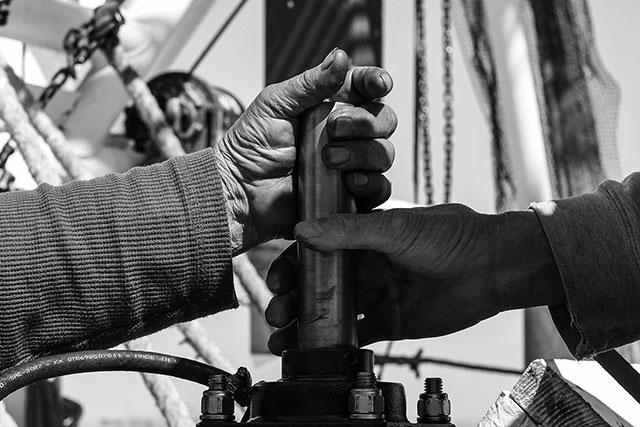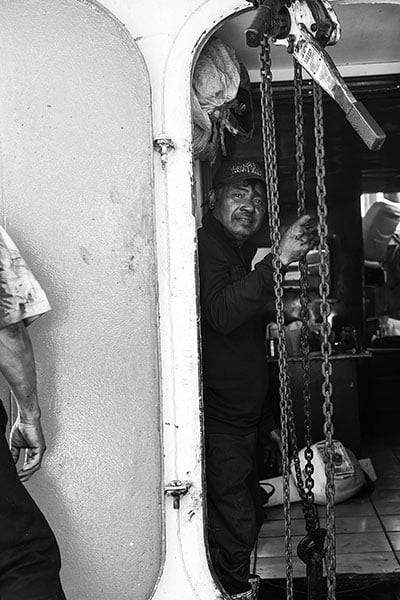For Louisiana’s fishing industry, the month of May marks a time of paramount economic importance: the inauguration of the shrimping season. But this year, like most over the past two decades, shrimping communities along Louisiana’s coast are forced to grapple with devolving economic realities caused by ever increasing global competition.
In 2005, Louisiana’s $2 billion seafood industry was beset by Hurricane Katrina, which ravaged the Gulf Coast, sinking ships, destroying docks and uprooting homes in fishing towns along the United States’ southern coast. Five years later, as the industry sat on the brink of recovery, it was hit yet again when BP’s Deepwater Horizon oil rig exploded, initiating an 87-day leak that spilled 210 million gallons of oil into the Gulf of Mexico. Today, Louisiana’s beleaguered shrimping communities have once again fought their way back from economic devastation, only to face more economic uncertainty as cheap shrimp imports drive prices to unprecedented lows.
Venice, the southernmost town on the Mississippi River, is one of these struggling towns. During the final week of April, the Venice Marina is bustling. The captains and crews of hundreds of shrimping vessels crowd the docks, making final preparations for their first outings of the year. Their boats have been anchored and unused for four months, and while there is an eagerness to start trawling, the mood is one of gloom and disappointment. The per-pound price of wholesale shrimp has just been announced, revealing that dockside prices will be lower than they were in the 1980s.
“We see people move out every year. They leave their boats and live someplace else. Everyone’s disgusted.”
While disheartening, the prices are certainly not surprising to the shrimpers of coastal Louisiana. Shrimp prices in the United States have continuously declined over the past few decades, a trend that can be attributed to the rapid growth of imported shrimp coming into the country. Between 1997 and 2002, shrimp imports tripled, leading to a 27 percent drop in prices. According to the US Department of Commerce, this surge can be ascribed to three main factors.
 A Venice native makes repairs to his son’s boat in preparation for shrimping season. (Photo: Michael Stein)First, the US enjoyed relative economic prosperity over this period of time in comparison to other major shrimp importers (Japan and the European Union). Second, the European Union adopted a more protectionist tariff system, incentivizing major shrimp producers to redirect their products to the US. Third, beginning in the late 1990s, higher levels of banned chemicals and antibiotics were found in imported shrimp, causing exporters to target the US, where food regulations and inspections are exceedingly relaxed. The US Food and Drug Administration (FDA) currently inspects about 1 percent of seafood imports.
A Venice native makes repairs to his son’s boat in preparation for shrimping season. (Photo: Michael Stein)First, the US enjoyed relative economic prosperity over this period of time in comparison to other major shrimp importers (Japan and the European Union). Second, the European Union adopted a more protectionist tariff system, incentivizing major shrimp producers to redirect their products to the US. Third, beginning in the late 1990s, higher levels of banned chemicals and antibiotics were found in imported shrimp, causing exporters to target the US, where food regulations and inspections are exceedingly relaxed. The US Food and Drug Administration (FDA) currently inspects about 1 percent of seafood imports.
Import totals have continued to climb since 2002, and in the past year alone, Gulf Coast shrimpers saw the price of shrimp drop 34 percent. Venice, a town centered around and reliant upon the shrimping industry, is facing an economic crisis.
“When the season starts, we’re broke,” said Murphi Lam, the owner and captain of the JD shrimping boat. He walks around the hull of his ship, pointing to various pieces of equipment and listing their cost: $20,000, $60,000, $40,000. Inside these bulky, unornamented ships is a collection of costly machinery that requires constant upkeep.
The captain of one ship, The Sea Flower, spent $160,000 in repairs during the recent off-season. The ship owners make these annual investments with the expectation that they’ll earn their money back when the season begins. In recent years, the promise of reimbursement has become tenuous, and the investment riskier. “I’m thinking about selling my boat,” Lam admits. “We just don’t make any money.”
 Two men bring crates of fish into an industrial refrigerator for storage. (Photo: Michael Stein)
Two men bring crates of fish into an industrial refrigerator for storage. (Photo: Michael Stein)
 A woman checks her crab traps in the brackish waters at the mouth of the Mississippi River. (Photo: Michael Stein)
A woman checks her crab traps in the brackish waters at the mouth of the Mississippi River. (Photo: Michael Stein)
Acy Cooper Jr., the president of the Louisiana Shrimping Association, fears that as the industry suffers, more people will leave Venice, and the community will fade. It’s a fear shared by hundreds of other communities along the United States’ southern coast that rely on the shrimp industry as their primary source of employment.
“It’s dying,” Cooper said of his hometown of Venice. “We see it happening; we see people move out every year. They leave their boats and live someplace else. They just don’t want to stay here because of what’s going on. Everyone’s disgusted. And it definitely needs to change; something needs to happen.”
 Two men work on their ship’s generator in preparation for their weeks-long journey into the Gulf of Mexico. (Photo: Michael Stein)
Two men work on their ship’s generator in preparation for their weeks-long journey into the Gulf of Mexico. (Photo: Michael Stein)
“You kill the fishing industry, the community’s dead.”
This mounting frustration was reflected in this winter’s Republican primary elections. Plaquemines Parish, where Venice is located, voted overwhelmingly for Donald Trump, the populist candidate who, unlike Republicans of recent memory, claims to voice fierce opposition to trade deals and globalization in defense of blue-collar workers. Trump claimed victories in every littoral parish in Louisiana, but his appeal to fishing communities is not limited to one state. He captured primary victories in 65 out of the 69 coastal counties in shrimp-producing states (excluding Ted Cruz’s home state of Texas). While his rhetoric is usually blunt and offensive (he recently referred to US trade with China as “rape“), his protectionist diatribes are resonating with dissatisfied US fishers.
Shrimping towns along the shores of South Carolina, North Carolina, Georgia, Florida, Alabama, Mississippi, Louisiana and Texas have been lobbying the government to take more protectionist action for over a decade. In the early 2000s, the Southern Shrimp Alliance successfully filed an anti-dumping petition against several of the world’s largest shrimp exporters, including China. The subsequent tariffs provided some relief to domestic producers, but many of the tariffs have been reduced since their introduction. Some criticize the tariffs for being too low, arguing that at current rates foreign producers can continue to undercut domestic prices by employing extremely cheap labor and, in some cases, slaves.
 The captain of the J.D. walks around the engine room of his ship. (Photo: Michael Stein)
The captain of the J.D. walks around the engine room of his ship. (Photo: Michael Stein)
Another reason shrimp imports have continued to rise is that exporters are illegally shipping shrimp through other countries to avoid paying tariffs and duck FDA alerts of banned substances in their seafood. “Transshipment is a very serious problem,” said John Williams, the director of the Southern Shrimp Alliance. “Malaysia is typically 1 percent or less of product coming to the US. When China started transshipment there, Malaysia all of a sudden became 6 percent to 8 percent of the total product coming to the US. That was all coming from China. You’re talking about millions and millions of pounds.” These trade practices demonstrate why some voters have been so receptive to Trump’s commonly repeated assertion that when it comes to trade, “we are getting a raw deal from China.”
 The crew of a shrimping vessel lowers a new engine into the hull of their ship. (Photo: Michael Stein)The aggregate, long-term effect of global free trade on the US economy is a divisive subject among economists and politicians alike. But while there is no clear consensus on the cumulative effect of globalization on GDP growth and job creation, what is clear is that growing global free trade is hurting blue-collar workers, and the suffering has been geographically and culturally concentrated. Studies by the Brookings Institution, the Economic Policy Institute and some of the world’s most revered economists concur: Globalization has depressed wages and depleted jobs for blue-collar workers.
The crew of a shrimping vessel lowers a new engine into the hull of their ship. (Photo: Michael Stein)The aggregate, long-term effect of global free trade on the US economy is a divisive subject among economists and politicians alike. But while there is no clear consensus on the cumulative effect of globalization on GDP growth and job creation, what is clear is that growing global free trade is hurting blue-collar workers, and the suffering has been geographically and culturally concentrated. Studies by the Brookings Institution, the Economic Policy Institute and some of the world’s most revered economists concur: Globalization has depressed wages and depleted jobs for blue-collar workers.
Job loss due to globalization can be particularly damaging because these jobs tend to be concentrated within specific industries — industries that form the economic backbone of certain communities. This is the plight that Detroit experienced as the auto industry rapidly withdrew from the city. The three major US car manufacturers are still headquartered in Detroit, but the manufacturing jobs have long since departed, succumbing to the pressures of economic globalization and leaving blue-collar workers devoid of occupational opportunity. Detroit’s population is now half of what it once was, many of its neighborhoods have died and the city has lost much of the cultural vibrancy it once enjoyed.
 The deckhand of a shrimping vessel drinks a beer after installing the ship’s new ice machine. (Photo: Michael Stein)This is an economic reality of global free trade that Venice faces today, albeit on a much smaller scale. “You kill the fishing industry, the community’s dead,” Cooper said. Shrimping isn’t just an economic necessity in Venice; it is the ethos of their culture. For hundreds of years, the town has shaped itself around the industry, with shrimping becoming a point of pride and way of life. It’s a narrative repeated in shrimping towns throughout the Gulf Coast, where people face not only the loss of employment, but the exodus of their neighbors and the loss of their culture.
The deckhand of a shrimping vessel drinks a beer after installing the ship’s new ice machine. (Photo: Michael Stein)This is an economic reality of global free trade that Venice faces today, albeit on a much smaller scale. “You kill the fishing industry, the community’s dead,” Cooper said. Shrimping isn’t just an economic necessity in Venice; it is the ethos of their culture. For hundreds of years, the town has shaped itself around the industry, with shrimping becoming a point of pride and way of life. It’s a narrative repeated in shrimping towns throughout the Gulf Coast, where people face not only the loss of employment, but the exodus of their neighbors and the loss of their culture.
Venice is not a wealthy town. It has lost its supermarket, and more recently, its post office, symbolic indicators that the town may not be destined for survival. But the people of Venice remain unflinchingly proud of where they live and what they do, and many have no intention of living anywhere else. If you ask people why their connection to the town is so strong, you will repeatedly hear the same response: “This is God’s country.”
“I don’t want to get rich; I just want to make a living,” Cooper said. “My dad’s 80 years old and still shrimping. I’m doing it, my sons are doing it, my grandson at home plays with a boat on the floor. Once you come on the boat you never get away from it; it’s in our blood.”
 The deckhand of the J.D. shrimping boat repairs the ship’s windows. (Photo: Michael Stein)
The deckhand of the J.D. shrimping boat repairs the ship’s windows. (Photo: Michael Stein)
 A shipyard worker laments about the lagging economy in Venice. (Photo: Michael Stein)
A shipyard worker laments about the lagging economy in Venice. (Photo: Michael Stein)
Join us in defending the truth before it’s too late
The future of independent journalism is uncertain, and the consequences of losing it are too grave to ignore. To ensure Truthout remains safe, strong, and free, we need to raise $34,000 in the next 72 hours. Every dollar raised goes directly toward the costs of producing news you can trust.
Please give what you can — because by supporting us with a tax-deductible donation, you’re not just preserving a source of news, you’re helping to safeguard what’s left of our democracy.
